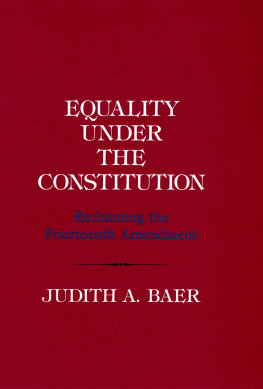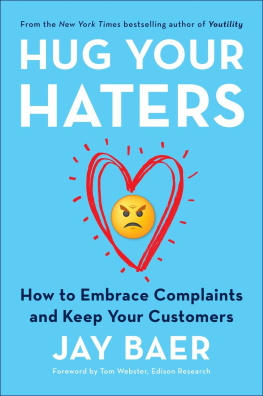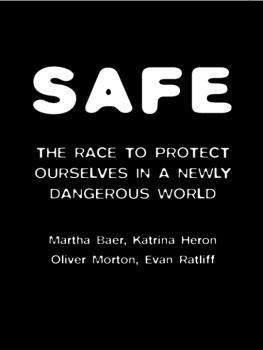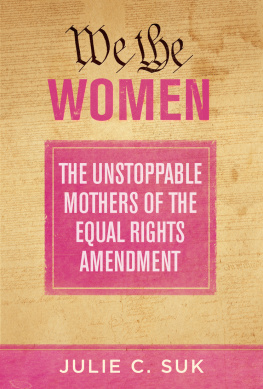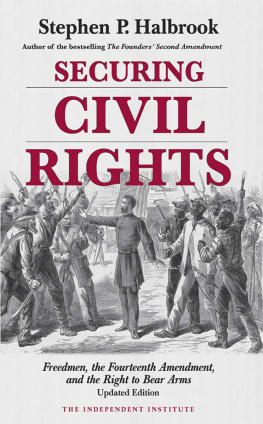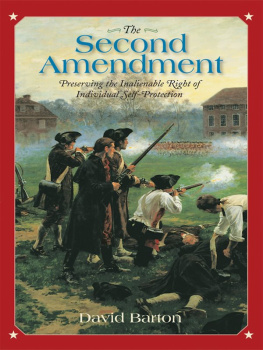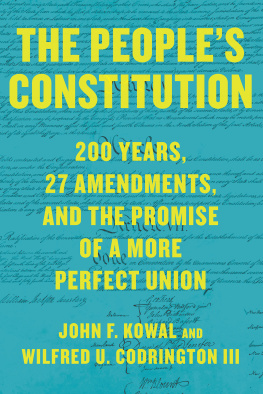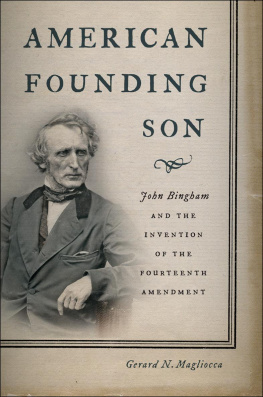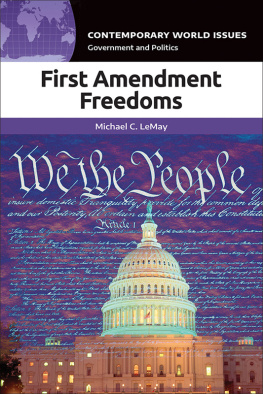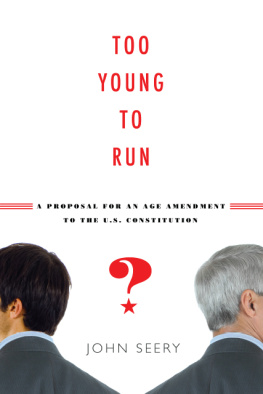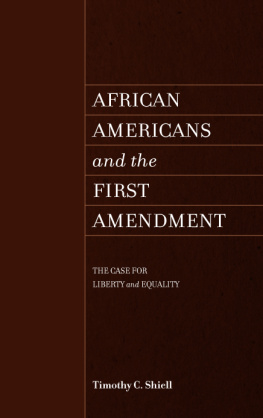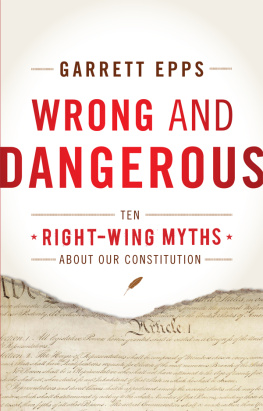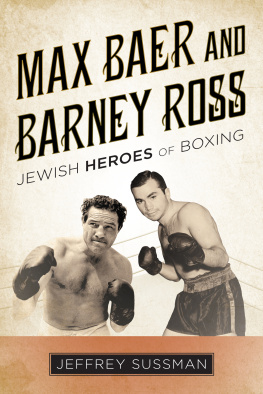Baer - Equality under the Constitution: reclaiming the Fourteenth Amendment
Here you can read online Baer - Equality under the Constitution: reclaiming the Fourteenth Amendment full text of the book (entire story) in english for free. Download pdf and epub, get meaning, cover and reviews about this ebook. City: Ithaca, year: 1984;2017, publisher: Cornell University Press, genre: Politics. Description of the work, (preface) as well as reviews are available. Best literature library LitArk.com created for fans of good reading and offers a wide selection of genres:
Romance novel
Science fiction
Adventure
Detective
Science
History
Home and family
Prose
Art
Politics
Computer
Non-fiction
Religion
Business
Children
Humor
Choose a favorite category and find really read worthwhile books. Enjoy immersion in the world of imagination, feel the emotions of the characters or learn something new for yourself, make an fascinating discovery.
Equality under the Constitution: reclaiming the Fourteenth Amendment: summary, description and annotation
We offer to read an annotation, description, summary or preface (depends on what the author of the book "Equality under the Constitution: reclaiming the Fourteenth Amendment" wrote himself). If you haven't found the necessary information about the book — write in the comments, we will try to find it.
Baer: author's other books
Who wrote Equality under the Constitution: reclaiming the Fourteenth Amendment? Find out the surname, the name of the author of the book and a list of all author's works by series.
Equality under the Constitution: reclaiming the Fourteenth Amendment — read online for free the complete book (whole text) full work
Below is the text of the book, divided by pages. System saving the place of the last page read, allows you to conveniently read the book "Equality under the Constitution: reclaiming the Fourteenth Amendment" online for free, without having to search again every time where you left off. Put a bookmark, and you can go to the page where you finished reading at any time.
Font size:
Interval:
Bookmark:

Americans think they believe in equality. We know that we are not equal in condition. Whatever Alexis de Tocqueville found in the 1830s, the realities of income distribution, education, and job opportunities today force us to acknowledge that we live in what is in many ways an inegalitarian society. But we cherish the ideal.
This was not always the case, though the idea of equality has always been available to us as a people. Thomas Jeffersons statement in the Declaration of Independence that all men are created equal has been an axiom of American political thought, but it has by no means been a truth that was self-evident to all Americans. The defenders of slavery rejected the notion, and so did some opponents of school integration in the 1950s. But today the opponents of vigorous enforcement of civil rights laws find it necessary to affirm their commitment to racial equality, while opponents of the Equal Rights Amendment, including the president of the United States, insist that they believe that men and women are equal. However often the word but follows these statementsand it usually doesthe speakers believe their own words.
Americans do not practice what they preach. But the contradiction is not only between ideal and reality. In fact, Americans do not believe in equality at all. When I began this book, I was pretty sure of the truth of that statement; now I am convinced of it. We accept the ideal only to a limited extent. We agree that some people once thought inferior to adult white males are in fact their equals and we may oppose distinctions based on religion, race, or wealth, but in principle we accept many other kinds of hierarchical arrangements and asymmetrical relationships. We do not quarrel much with the general principle of dominance and inequality.
An example of this acceptance comes from an article by the historian Howard Zinn, published in 1965. Writing of the civil rights movement, Zinn discussed the conditions under which southern blacks (Negroes in 1965) lived, and the effects of racism on them. Their entire way of life, Zinn declared, is conditioned by the fact that the women must be office cleaners rather than stenographers, that the men must be porters rather than foremen. Look at that sentence. Does it not imply that it is wrong for job opportunities to be limited by race, but all right to have them limited by sex, class, and education?
Another example dates from 1967, the year in which the Selective Service System stopped giving draft deferments to graduate students. President Nathan Pusey of Harvard University made a comment about this decision which he intended to be witty, and most people who heard it agreed. Next year, Pusey quipped, we shall be left with the lame, the halt, the blind, and the female. The womens liberation and disability rights movements are now strong enough so that an executive who made such a remark might well be forced to resign, as Earl Butz had to resign from President Fords cabinet when he made a racist joke. But in the 1960sthe radical, mellow 1960sa crack like Puseys was considered funny.
Still another example comes from Joseph Persicos biography of Nelson Rockefeller. Persico describes a staff meeting at Governor Rockefellers estate:
T. Norman Hurd, then state budget director and a leading authority on public finance, was explaining a passage when a towheaded child bounded into the room. Dr. Hurd stopped as Nelson swept three-year-old Mark, his youngest son, onto his knee. As Dr. Hurd started to speak again, Mark began talking. Nelson stopped to listen, not to Dr. Hurd but to Mark. Hurd stopped too, with a frozen smile. Thus we plodded on, halting whenever Mark had something to say. Yes, thats right, Marky. Thats a two. And that number is a nine. See, were on page twenty-nine, Nelson patiently instructed his son. Everyone grinned on cue.
I thought of how I was raising my own children. I did not like them to interrupt when I was talking to friends, and I did not enjoy having other peoples howling Indians intrude on good conversation. But, little Mark went on happily having his say, while his father responded and we waited. Nelson Rockefeller was passing along an unspoken lesson absorbed
The gratuitous reference to howling Indians is revealing enough. But Persicos point is that young Mark is learning from his father that rich people are better than the rest of us. Persico implies that such hierarchy is unjust, and most readers would agree that it is wrong to expect the nonrich to be silent while the rich speak. But it is perfectly proper (however unrealistic) to expect children to be silent, or perhaps absent, while adults speak. Never mind their age, their positionthese factors, not wealth, are what should matter. A hierarchy based on wealth is wrong, but a hierarchy based on age is legitimate. Again, the principle of inequality is acceptedit is just limited. In none of these examples can we tell which principle is the rule and which the exception.
This book reveals many examples of this kind of thinking. I do not emphasize the old problems of racism and sexism. Nor do I stress economic inequality, although much of what I say has economic implications. I am primarily concerned with new issuesthough they are old problemswhich have gained attention only in recent years. One of these topics is preferential treatment, a new wrinkle in the old controversies over racial and sexual equality. I deal also with the rights of children, older people, and the disabled, all of whom have been the focus of new civil rights movements. Finally, I take up the rights of homosexuals, a group long subject to public hostility, who have also begun to make public claims. And in each case, I discover that we, as a people, have not taken the principle of equality far enough, and that the language and history of our Constitution urge us to take the principle further.
But, a reader may ask, why the Constitution? Even readers committed to the study of constitutional law may wonder, Why these particular issues, and not others? And, since every isssue I address is one on which opinions are vehement and varied, Why your particular answers to these questions? The first question is the easiest to answer. I emphasize the Constitution because I am fascinated by constitutional interpretation, because I believe it must be the province of social scientists, philosophers, and historians as well as lawyers and judges, and because I think we can learn much from court opinions and legislative debates about normative questions. Such scholarship is particularly important in this area because, as I argue in the book, constitutional equality has been and continues to be badly and dangerously misunderstood. We need to know, we do not know enough, and much of what we think we know is not true.
Then why choose these groups, and these claims? I examine them partly because they are topical, because there is just enough material on each of them to allow fresh discussion (except in the area of reverse discrimination, where the material is voluminous, but which no student of equality can ignore). I also found that these new claims are related to one another, and to earlier causes. Childrens rights have much in common with the rights of the disabled, and many of the litigants who figure prominently in Chapters 7 and 8 were in trouble partly because they were black. But why these problems rather than others that are also interrelated and topical, or, for that matter, why choose claims that have been made rather than seek to discover claims that have not yet been made, but perhaps should be?
My answer to this question and my conclusions have personal roots. Scholars are often warnedat least, this particular scholar has often been warnedto remain detached and objective, to keep themselves out of their work. It is true that scholarship is a different enterprise from either advocacy or autobiography. But I am convinced that personal opinion and experience need not distort inquiry, but can inform and enrich it. Equality under the Constitution reflects this conviction. It is not a detached book. The analysis is as impartial and balanced as I know how to make it, but I have not tried to hide my opinions. And while I did resist the temptation to include autobiographical anecdotes, this book is not divorced from the life of the person who wrote it.
Next pageFont size:
Interval:
Bookmark:
Similar books «Equality under the Constitution: reclaiming the Fourteenth Amendment»
Look at similar books to Equality under the Constitution: reclaiming the Fourteenth Amendment. We have selected literature similar in name and meaning in the hope of providing readers with more options to find new, interesting, not yet read works.
Discussion, reviews of the book Equality under the Constitution: reclaiming the Fourteenth Amendment and just readers' own opinions. Leave your comments, write what you think about the work, its meaning or the main characters. Specify what exactly you liked and what you didn't like, and why you think so.

